
Journal of Cardiovascular Development and Disease
Scope & Guideline
Advancing cardiovascular knowledge for a healthier tomorrow.
Introduction
Aims and Scopes
- Cardiovascular Development and Embryology:
Research in this area explores the mechanisms and molecular pathways involved in heart development, congenital heart defects, and the role of genetic factors in cardiac morphology. - Cardiovascular Diseases and Risk Factors:
The journal publishes studies that investigate the epidemiology, diagnosis, and treatment of cardiovascular diseases, including heart failure, coronary artery disease, and arrhythmias. - Interventional and Surgical Techniques:
This scope includes articles on the latest advancements in minimally invasive procedures, surgical techniques, and device innovations for managing cardiovascular conditions. - Cardiovascular Imaging and Diagnostics:
Research focusing on imaging technologies such as echocardiography, MRI, and CT scans, aimed at improving diagnostic accuracy and assessing disease progression. - Biomarkers and Molecular Mechanisms:
The journal emphasizes studies identifying novel biomarkers and understanding the biochemical pathways that contribute to cardiovascular diseases and their treatment outcomes. - Patient-Centered Care and Outcomes:
There is a focus on studies assessing the quality of life, patient satisfaction, and the impact of various treatment regimens on patient outcomes in cardiovascular care. - Technological Innovations in Cardiology:
The journal highlights research on artificial intelligence, telemedicine, and digital health technologies aimed at improving cardiovascular care and patient management.
Trending and Emerging
- Artificial Intelligence and Machine Learning:
There is a growing trend towards incorporating AI and machine learning in cardiovascular diagnostics and treatment optimization, enhancing predictive capabilities and personalized care. - Telemedicine and Remote Monitoring:
Research on telehealth solutions and remote patient monitoring technologies is on the rise, driven by the need for accessible care models and the impact of the COVID-19 pandemic. - Regenerative Medicine and Stem Cell Therapy:
Innovations in regenerative therapies, including the use of stem cells for cardiac repair and recovery, are increasingly featured, reflecting a shift towards repairing rather than replacing damaged tissues. - Personalized and Precision Medicine:
Studies focusing on tailoring treatment approaches based on genetic, phenotypic, and environmental factors are gaining momentum, underscoring the importance of individualized patient care. - Impact of COVID-19 on Cardiovascular Health:
Research exploring the cardiovascular implications of COVID-19, including long-term effects and management strategies, has surged, highlighting the pandemic's profound impact on cardiovascular research. - Integration of Behavioral Health in Cardiovascular Care:
There is an emerging focus on the interplay between psychological factors, such as stress and depression, and cardiovascular health, emphasizing holistic approaches to treatment.
Declining or Waning
- Traditional Pharmacological Approaches:
Research focusing solely on conventional drug therapies for cardiovascular diseases has decreased, as there's a growing emphasis on personalized medicine and combination therapies. - Basic Science Without Clinical Application:
While fundamental research is essential, there is a noticeable decline in studies that do not translate into clinical practice or that lack direct relevance to patient outcomes. - Single-Modality Imaging Studies:
The journal has seen fewer studies dedicated solely to one imaging modality, such as echocardiography alone, as multi-modal imaging approaches become more favored for comprehensive assessments. - Generalized Risk Factor Studies:
There is a waning interest in broad studies examining risk factors without specific contextualization or innovative approaches, as targeted and personalized research gains traction. - Historical Case Studies:
The publication of studies centered on historical cases or retrospective analyses without new insights or methodologies has diminished, reflecting a shift towards contemporary and future-focused research.
Similar Journals
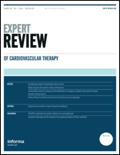
Expert Review of Cardiovascular Therapy
Fostering Innovation in Cardiovascular MedicineExpert Review of Cardiovascular Therapy is a leading academic journal published by TAYLOR & FRANCIS INC, focusing on innovative and impactful research in the field of cardiovascular medicine. With an ISSN of 1477-9072 and an E-ISSN of 1744-8344, this journal serves as an essential resource for researchers, clinicians, and educators, offering a platform for the dissemination of critical advancements in cardiovascular therapy and internal medicine. Since its inception in 2003, the journal has maintained a reputable standing with a Q2 ranking in various categories including Cardiology and Cardiovascular Medicine, reflecting its influence and rigor in the field. The journal, which is based in the United Kingdom, does not currently offer Open Access options, ensuring that its content is accessible primarily to subscribers. With its commitment to high-quality, peer-reviewed articles, Expert Review of Cardiovascular Therapy is dedicated to bridging the gap between experimental research and clinical application, thereby enhancing patient care and therapeutic outcomes in cardiovascular health.
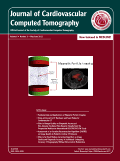
Journal of Cardiovascular Computed Tomography
Transforming cardiovascular medicine with cutting-edge research.The Journal of Cardiovascular Computed Tomography, published by Elsevier Science Inc, is a premier international journal dedicated to the field of cardiovascular imaging and technology. With a strong impact factor, it serves as a pivotal platform for disseminating cutting-edge research and advancements from 2007 to 2024, specifically within the realms of cardiology and radiology. The journal holds a distinguished Q1 ranking in both Cardiology and Cardiovascular Medicine and Radiology, Nuclear Medicine and Imaging, reflecting its influential role in shaping clinical and academic discourse in these fields. Notably, the journal boasts impressive Scopus rankings, placing it in the top decile of its categories, highlighting its high-quality publications and significant contribution to the scientific community. Although it does not operate under an open access model, it ensures robust accessibility for researchers, professionals, and students eager to stay informed about the latest innovations and studies in cardiovascular computed tomography. The Journal of Cardiovascular Computed Tomography is essential for anyone involved in cardiovascular research, offering valuable insights and fostering collaborations across disciplines.

Frontiers in Cardiovascular Medicine
Pioneering Research in Cardiology and Beyond.Frontiers in Cardiovascular Medicine is a leading open-access journal published by FRONTIERS MEDIA SA, dedicated to advancing research in the field of cardiology and cardiovascular medicine. Since its inception in 2014, the journal has become a vital platform for the dissemination of high-quality research, boasting a commendable Q2 rank in the 2023 category for Cardiology and Cardiovascular Medicine. With a focus on promoting innovative studies and clinical insights, Frontiers in Cardiovascular Medicine facilitates open access to its content, allowing researchers, healthcare professionals, and students from around the globe to engage with the latest findings which are critical for the advancement of cardiovascular health. The journal's significant presence in the academic landscape, as indicated by its Scopus ranking (161/387 and 58th percentile), underscores its importance as a research outlet in this essential field. Located in Lausanne, Switzerland, the journal continues to support the global cardiovascular community by encouraging collaboration and knowledge sharing to address the challenges faced in cardiovascular medicine today.
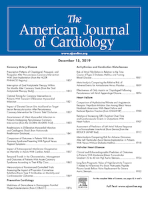
AMERICAN JOURNAL OF CARDIOLOGY
Leading the Charge in Cardiovascular Discovery and ExcellenceThe American Journal of Cardiology is a leading peer-reviewed journal in the field of Cardiology and Cardiovascular Medicine, published by Excerpta Medica Inc-Elsevier Science Inc. Since its inception in 1958, the journal has consistently contributed to the advancement of cardiovascular research, providing a platform for groundbreaking studies and clinical findings that shape modern medical practices. With an impressive impact factor placing it in the Q1 category in its field for 2023, it ranks among the top journals in medicine, with a rank of #155 out of 387 in the Scopus database, reflecting its significance and rigorous editorial standards. The journal is committed to disseminating high-quality research that fosters innovation and enhances clinical outcomes in cardiology. Although it does not provide Open Access options, the American Journal of Cardiology remains an essential resource for researchers, healthcare professionals, and students looking to deepen their understanding of cardiovascular health.

Netherlands Heart Journal
Uniting Researchers to Revolutionize Cardiovascular CareNetherlands Heart Journal is a premier academic publication dedicated to advancing knowledge in the field of cardiology and cardiovascular medicine. Published by BOHN STAFLEU VAN LOGHUM BV, this journal has established itself as a critical platform for researchers, professionals, and students seeking to explore groundbreaking findings and innovative practices in cardiovascular health. With an ISSN of 1568-5888 and E-ISSN 1876-6250, the journal boasts a respectable Q2 ranking in the Cardiology and Cardiovascular Medicine category, placing it in the top half of its field according to the 2023 quartiles. The Scopus ranking places it 130th out of 387 in the relevant category, indicating a commendable percentile rank of 66th, which attests to its influence and quality of published research. Spanning from 2005 to 2024, the journal endeavors to include a diverse array of topics, encompassing clinical practice, technological innovations, and public health considerations related to cardiovascular diseases. Researchers and practitioners are encouraged to engage with the journal's robust content, contributing to and benefiting from the collaborative effort to enhance cardiovascular health worldwide.
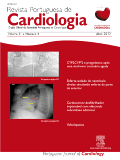
Revista Portuguesa de Cardiologia
Transforming cardiovascular medicine with cutting-edge research.Revista Portuguesa de Cardiologia, published by Elsevier España SLU, stands as a pivotal resource in the realm of Cardiology and Cardiovascular Medicine. With its origins tracing back to 1970, this journal has cultivated a robust academic presence, achieving a 2023 Q3 ranking in its category, and currently holding a position of #220 out of 387 on the Scopus rankings, placing it within the 43rd percentile of its field. This open access journal, available since 2011, aims to disseminate high-quality research and insights relevant to contemporary cardiovascular issues. Its commitment to accessibility and knowledge exchange enhances its importance for clinicians, researchers, and students alike, fostering a more informed community in the fight against cardiovascular diseases. Operating from its base in Barcelona, Spain, the journal welcomes contributions that further the understanding and treatment of heart conditions, contributing significantly to the advancement of cardiovascular health.
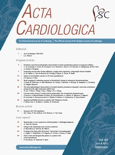
ACTA CARDIOLOGICA
Elevating standards in cardiovascular health research.ACTA CARDIOLOGICA is a distinguished journal published by TAYLOR & FRANCIS LTD, focusing on the dynamic fields of Cardiology and Cardiovascular Medicine. Established in 1946, the journal has maintained a significant presence in the academic community, providing a platform for cutting-edge research and clinical studies that aim to address challenges in cardiovascular health. With its Q3 rating in both Cardiology and General Medicine categories, it showcases a robust compilation of articles that reflect the evolving landscape of cardiac care. Although ACTA CARDIOLOGICA is not an Open Access journal, it continues to serve a vital role for researchers, professionals, and students dedicated to advancing knowledge in cardiovascular health. This journal, with an ISSN of 0001-5385 and E-ISSN of 1784-973X, is a critical resource for those looking to stay updated on the latest developments and practices in the specialization, contributing significantly to the field until 2024 and beyond.
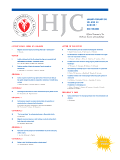
Hellenic Journal of Cardiology
Exploring New Frontiers in Cardiology and Cardiovascular MedicineThe Hellenic Journal of Cardiology, a peer-reviewed open-access publication under the esteemed ELSEVIER banner, proudly represents the forefront of research in the field of Cardiology and Cardiovascular Medicine. Established in 1993 and actively publishing since then, this journal has carved a niche in disseminating high-quality research and clinical insights relevant to cardiovascular health in Greece and beyond. With an impressive Q2 ranking in both Cardiology and Cardiovascular Medicine categories as of 2023, the journal holds a commendable position at Rank #126/387 in Scopus, indicative of its critical role in advancing scientific knowledge and practice. The Hellenic Journal of Cardiology transitioned to open access in 2016, ensuring that ground-breaking research is freely accessible, fostering a global dialogue among researchers, clinicians, and students alike. Its publication frequency spans significant years, providing a continuous flow of innovative findings while addressing pressing cardiovascular issues. As the journal builds on its legacy, it aspires to enrich the academic community's understanding of cardiovascular medicine, making it an invaluable resource for anyone invested in heart health.

CANADIAN JOURNAL OF CARDIOLOGY
Advancing Cardiovascular Knowledge Since 1985Canadian Journal of Cardiology (ISSN: 0828-282X, E-ISSN: 1916-7075), published by Elsevier Science Inc, serves as a vital platform for disseminating high-quality research in the dynamic field of cardiology and cardiovascular medicine. Since its inception in 1985, this journal has established itself as a leader in the field, currently holding a prestigious Q1 ranking in Cardiology, indicating its significant impact and contribution to medical science. With a Scopus rank of #50 out of 387 in its category and placing in the 87th percentile, the journal showcases rigorous peer-reviewed articles that advance knowledge and practice in cardiology. Although the journal is not open access, it provides valuable insights and research findings that cater to clinicians, researchers, and students who are committed to improving cardiovascular health. As we approach the convergence of years to 2024, the Canadian Journal of Cardiology continues to strive for excellence, facilitating a discourse vital for both academic and clinical advancements in cardiology.

World Journal of Cardiology
Exploring the frontiers of cardiology and cardiovascular medicine.World Journal of Cardiology, published by BAISHIDENG PUBLISHING GROUP INC, stands out as a pivotal resource in the field of cardiology and cardiovascular medicine. With an ISSN of 1949-8462, this journal serves a global audience, promoting knowledge dissemination and collaboration among researchers, healthcare professionals, and students dedicated to advancing cardiovascular health. The journal demonstrates its credibility and impact in the field by achieving a respectable Q2 ranking in the 2023 category of Cardiology and Cardiovascular Medicine. Notably, it is listed in the Scopus database, ranking #189 out of 387 journals, placing it in the 51st percentile, which underscores its relevance and contribution to contemporary cardiovascular research. Although it operates under a subscription model, the journal provides diverse access options, ensuring that critical findings reach a wide audience. Through its comprehensive scope and commitment to publishing high-quality articles, the World Journal of Cardiology plays a vital role in shaping the future of cardiovascular science, making it an invaluable asset for those involved in this essential discipline.